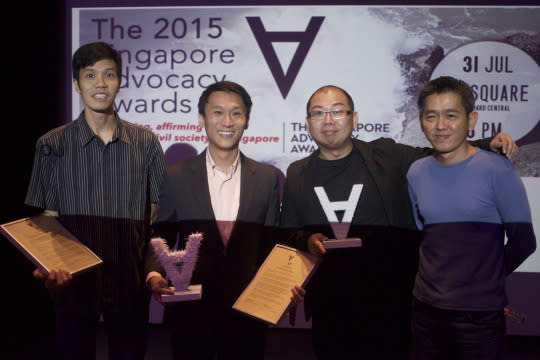Civil society activism recognised: efforts still needed amid new challenges

(L-R) Award winners Howard Lee, Remy Choo, Terry Xu and Andrew Loh at the Singapore Advocacy Awards. Lee, Xu and Loh run The Online Citizen while Choo is a lawyer. (Photo: Calum Stuart)
By: Calum Stuart
There are few occasions where the recipient of an award can watch as their trophy looks back at them. But now, multiple tiny eyes will be staring down the team at The Online Citizen from wherever they place the trophy for Civil Society Advocate Organisation of the Year in their office.
Dana Lam, who designed the trophies for the recent Singapore Advocacy Awards (SAA), explained the upside-down ‘A’ covered in hundreds of tiny, but intricately placed, googly-eyes as representative of the bizarre, and often self-reflective, nature of an activist’s work.
The award ceremony, which took place at 10sq in Orchard Central Friday last week, celebrated those who have been involved in Singapore’s civil society. The awards were handed out to those who have worked tirelessly for their cause; in fact, architectural historian Dr Imran bin Tajudeen, named Most Promising New Civil Society Advocate of the Year, was not even able to collect his award personally as he was still out doing fieldwork. Only in its second year, organisers kept the awards as a low-key occasion.
This is not unusual for Singapore’s civil society groups. In a scene where everybody knows almost everyone else, by and large the members of the various NGOs and activist groups maintain a loose and informal relationship. This casual approach to each other largely comes from the lack of attention civil activism tends to draw in Singapore. In this respect, the SAA was formed as a way to recognise the work the scene’s participants are doing, as they often do not receive recognition elsewhere.
Civil society still needed to address issues of inequality
“[Before now there was] never really much focus on advocacy groups, or minorities, or what the alternative opinions in Singapore’s society are,” said Howard Lee, an editor at news-website The Online Citizen. “I think we need more of these voices coming out to give more of a holistic picture.”
Discussions of progress and development at the SAA, and civil society in general, retain a general modesty compared to the often rapid change in other parts of Singapore, such as the finance sector or the city’s skyline. While much of the crowd at the SAA is younger, veterans of Singapore’s activist scene recall the often difficult journey that activist groups have been through over the years.
Long-time civil activist, Constance Singam, chair of The Working Committee 3 which organised the awards, remarked in her opening speech: “Civil society activism [has] come a long way from the time I became an activist. And it isn’t because we are in a more open society, but because activists have become more outspoken, more bold and indeed more innovative. We saw a need to create our own heroes, honour and celebrate the extraordinary people who inspire us to do more than we think we are able.”
“If we take a look at Singapore’s history, there have been instances where civil society groups have found it very difficult to succeed because of various pressures which are placed on them,” said Lee. “But recently we are seeing a greater emergence of civil society members who are out there pushing the boundaries, with the view of making Singapore a better place.“
While there has been progress in Singaporean civil society, the award’s attendees know that much work will still be needed. Although today’s advocates do not operate in the same fraught environment that led to detentions without trial during Operation Spectrum in the late 1980s, many similar problems related to free speech and political activism still remain.
“It’s more difficult because you need to explain why society needs to keep changing and progressing,” said Remy Choo, who received the Civil Society Advocate of the Year award for his public litigation work. “That’s the space civil society advocates find themselves in now – having to explain that freedom of speech is still a problem; defamation, the sedition, are still extremely problematic, even though it wasn’t used in with the brutality it was in the 80s and 90s.
“So [realistically] it’s less problematic [now], but it also makes the work more challenging.”

